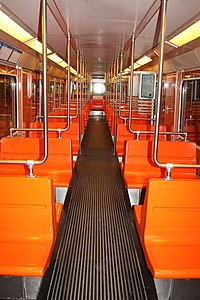HKL Class M100
| HKL class M100 | |
|---|---|
 A refurbished M100 train, July 2011 | |
 Interior of a M100 carriage | |
| In service | 1982–present |
| Manufacturer | Valmet, Strömberg |
| Assembly | Tampere, Finland |
| Constructed | 1977–1984 |
| Refurbished |
|
| Number built | 84 cars (42 pairs) |
| Predecessor | "Nokkajuna" (M100's 1977 prototype) |
| Successor | M200 |
| Formation | 2 cars |
| Fleet numbers | 101–184 |
| Capacity | 65 seats (per car, one train consists of two cars) |
| Operator(s) | Helsinki City Transport (HKL) |
| Depot(s) | Roihupelto Depot[1] |
| Line(s) served | Helsinki Metro: M1, M2 |
| Specifications | |
| Train length | 44.2 m |
| Width | 3.2 m |
| Height | 3.7 m |
| Doors | 3 pairs per side |
| Wheel diameter | 840 mm |
| Maximum speed | 100 km/h, limited to 80km/h |
The HKL Class M100 is the first and oldest class of metro trains in use on the Helsinki Metro. One train consists of two individually numbered cars. A total of 42 car pairs (84 cars in total) were manufactured between 1977 and 1984.[2][3]
Up to six pairs can be combined into a 12-car train formation, however due to the relatively short length of the platforms (especially on the new Länsimetro extension), at most only two pairs (giving a 4-car formation per train; and prior to the Länsimetro opening in 2017 three pairs resulting in 6-car formations could also be seen during rush hour) can be combined for passenger service. Longer combinations are used in maintenance operations. Any Helsinki metro train types can be combined mechanically, such as for towing.
The first three units (cars 101–106) were constructed as prototypes in 1977 and have some minor technical differences compared to the later units. The prototype units are no longer in active use.
The M100 trains underwent its first round of refurbishment in 2004–2009, at the Talgo Oy (now Škoda Transtech) rolling stock works at Otanmäki. In 2017, the City Council of Helsinki decided to refurbish class M100 and class M200 trains in order to extend their lifetime for another 10 years. The renovation will start in late 2019 and will be completed by government-owned VR FleetCare. It is planned to delay acquiring new metro trains for the potential automation of the metro system, due to the decision to cancel the contract to automate the Helsinki Metro in 2015. The prototype trains (101–106) will not be renovated.[4][5]
Accidents and incidents[]

- On 27 July 2016, M100 carriage no. 157 was involved in an accident with M300 carriage no. 302 when the latter derailed near Itäkeskus metro station during testing.
See also[]
References[]
- ^ "Track and depot". Helsingin kaupunki. Retrieved 2019-06-04.
- ^ Saarenaho, Ilari. "HKL: Metrovaunut 101-184 (1977 - 84) / HKL: Metro trains 101 - 184 (1977 - 84)". Suomen Raitiotieseura (www.raitio.org) (in Finnish). Retrieved 2019-06-03.
- ^ "M100". Helsingin kaupunki. Retrieved 2019-06-04.
- ^ "M100 –metrojunien peruskorjauksen hankesuunnitelma". dev.hel.fi (in Finnish). Retrieved 2019-06-04.
- ^ Promaint-lehti. "VR Kunnossapito selätti kilpailijat HKL:n metrojunien urakassa". promaintlehti.fi (in Finnish). Retrieved 2019-06-04.
External links[]
 Media related to HKL Class M100 at Wikimedia Commons
Media related to HKL Class M100 at Wikimedia Commons
- Helsinki Metro
- Multiple units of Finland
- Valmet